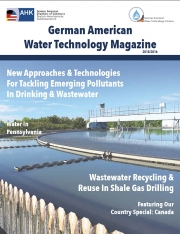
Promoting Innovation Through the Assessment of Changes in Fresh Water Ecosystem Services
The DESSIN ESS Evaluation Framework
- Publication
- Citation
Anzaldua, Gerardo; Nadine Vanessa Gerner, Sarah Beyer, Manuel Lago, Issa Nafo & Sebastian Birk: Promoting Innovation Through The Assessment Of Changes In Fresh Water Ecosystem Services: The DESSIN ESS Evaluation Framework. German American Water Technology Magazine Vol. 2015/2016, No. 4, 40-42.
Members of the research team of the European water research project DESSIN, a four-year EU-funded FP7 project, published an article in the GAWT Magazine. Authored by Gerardo Anzaldua, Sarah Beyer and Manuel Lago from Ecologic Institute, Nadine Vanessa Gerner and Issa Nafo from the Emschergenossenschaft and Sebastian Birk from the University of Duisburg-Essen, the article provides insights on key findings and presents the evaluation framework developed during the project.
The project DESSIN demonstrates and promotes innovative solutions for water scarcity and water quality related challenges for the implementation of the European Water Framework Directive (WFD). The overall aim of the project is to demonstrate how innovative solutions in the water cycle can enhance the services provided by freshwater ecosystems and therefore increase the benefits and attached values that are derived from them.
The applied framework and key contribution of DESSIN, the DESSIN ESS Evaluation Framework, uses an integrated methodology for the evaluation of changes in ecosystem services (ESS). The article describes the foundations and components of the framework, its application and gives the example of the Emscher river, one of the case studies carried out in the course of the project to test and validate the framework.
The article concludes that the use of the DESSIN ESS Evaluation Framework facilitates the delineation and assessment of changes in ESS that result from the implementation of water management innovations in the examined ecosystems. This enables a more informed selection of the most promising solutions for water management that takes into consideration impacts on the water body as well as wider economic implications.




